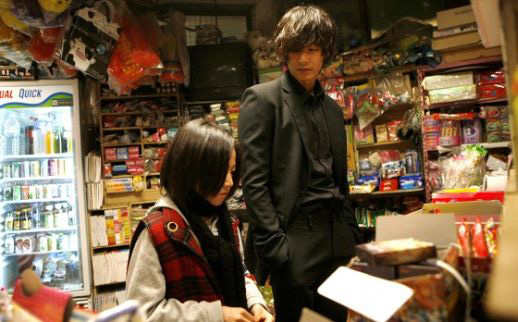The skies were overcast, the rains fell in little droplets and then only sporadically. Yet how would VanRamblings know what was going on in the outside world when we found ourselves comfortably sequestered inside the Empire Granville 7’s largest screening room (that’d be the Visa Screening Room / Theatre 7) from 10 a.m. til 9 p.m., where we saw four different films which we admired to varying degree but none more ‘likeable’ than …

The Man From Nowhere (Grade: A): A Korean take on American films like The Professional and Man on Fire, Korea’s redemptive mob action movie, The Man From Nowhere, does have a taciturn ‘last principled male hero’ setting out to rescue a young girl, but everything else about this propulsive film is utterly original and compellingly watchable, an irresistible sub-genre revenge flick that emerges as the must-see film at this year’s Festival. Evocative, suspenseful, lushly appointed and glossily designed as the film may be, as director Lee Jeong-Beom and cinematographer Lee Tae-Yoon set about to unravel the film’s web of layers of evil, it’s the film’s brooding sympathetic hero’s (Won Bin) warm, humane interplay with marvelously fresh and natural child actress Kim Sae-ron that pulls you into the film, holding you in its grip for its entire two-hour running time. Easy to see why The Man From Nowhere is Korea’s top-grossing film this year. Plays again, Wed., Oct. 6 @ 6:20pm, Gr 7, Th3, & Sat., Oct. 9 @ 10:30am, Gr7, Th7.
![]()
![]()
![]()
Although we weren’t quite as enraptured with the three remaining films we saw on Monday, we were nonetheless delighted and happy to have spent 11 hours watching first-rate foreign cinema inside the Empire Granville 7.
Poetry (Grade: B): This South Korea-based Cannes’ Best Screenplay winner represented a decidedly slower change-of-pace after our first screening, but Poetry enthralled as it told its story of Mija (Yun Jung-hee), a sixty-
something woman raising her deadbeat 16-year-old grandson while working as a maid and personal assistant to a stroke-ridden elderly man. That the 139 minutes just flew by is testament to Yun Jung-hee’s captivating performance, and Lee Changdong’s directorial skill. Addressing the issues of grief and guilt in the wake of tragedy (the repeated gang rape of the grandson’s classmate, and the fallout from the girl’s suicide), Poetry is far from florid filmmaking, but rather offers the viewer a haunting yet liberating portrait of female agency overcoming institutionalized male aggression. There’s a final screening of Poetry Thurs., Oct. 7 @ 8:45 pm, Park Theatre.
Biutiful (Grade: B-): Co-winner of the Best Actor award at Cannes this year, there’s no question that Javier Bardem’s central performance as Uxbal, a crook with a conscience operating in the back alleys and underground factories of Barcelona, represents tour-de-force acting, but there’s a remorseless, cloying aspect to the film that — despite Uxbal’s tender and spiritually transcendent relationship with his two kids, Ana (Hanaa Bouchaib) and Mateo (Guillermo Estrella), and how that helps to pull us into the film — with its overheated screenplay involving the accidental but still preventable death of more than 20 migrant workers; Uxbal’s terrifically volatile relationship with the kids’ boozy, bipolar mother, Marambra (Maricel Alvarez); the film’s whispery dialogue; the Senegalese drug dealers and the fallout from a police bust; Uxbal’s ill health and how that impacts … well, for this viewer at least, it was all a little too much. Clearly, other critics disagree with our disparaging take, though, including RopeofSilicon’s Brad Brevet, ScreenDaily’s Jonathan Romney, and Cinematical’s Joe Utichi. Although, there are no more VIFF screenings planned, as Biutiful has been picked up for North American distribution by Roadside Attractions, it’ll be back in the theatres relatively soon, so you can catch it then if you’re of a mind.
And as our final salutary screening of the day we stayed in Theatre 7 for …
Kawasaki’s Rose (Grade B): Prolific Czech director Jan Hrebejk’s (Divided We Fall) latest political drama addresses the weighty subject of Czechs coming to terms with their collaborationist past under communism. A consummate director of actors, none of the performers let Hrebejk down. Martin Huba, who plays a respected university prof and former clinical psychiatrist famous for standing up to the communist regime in the past, his loving, supportive wife (Daniela Kolárová), grown daughter, Lucie (Lenka Vlásaková) and her restless teen daughter (Anna Siminová), as well as Petra Hrebícková, are all excellent. These are people you actually want to spend some time with. Sad to say, there are no more VIFF screenings.